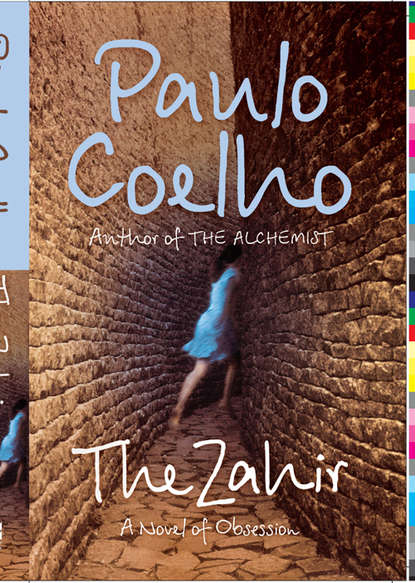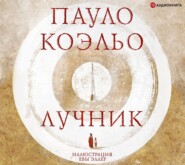По всем вопросам обращайтесь на: info@litportal.ru
(©) 2003-2024.
✖
The Zahir: A Novel of Obsession
Автор
Год написания книги
2018
Настройки чтения
Размер шрифта
Высота строк
Поля
Even if she had slept with him and fallen in love, wouldn’t she weigh in the balance all the time that we had spent together and everything we had conquered before setting off on an adventure from which there was no turning back? She was free to travel whenever she wanted to, she lived surrounded by men, soldiers who hadn’t seen a woman in ages, but I never asked any questions, and she never told me anything. We were both free, and we were proud of that.
But Esther had disappeared and left clues that were visible only to me, as if it were a secret message: I’m leaving.
Why?
Is that question worth answering?
No. Because hidden in the answer is my own inability to keep the woman I love by my side. Is it worth finding her and persuading her to come back? Begging and imploring her to give our marriage another chance?
That seems ridiculous: it would be better merely to suffer as I had in the past, when other people I loved had left me. It would be better just to lick my wounds, as I had also done in the past. For a while, I’ll think obsessively about her, I’ll become embittered, I’ll bore my friends because all I ever talk about is my wife leaving me. I’ll try to justify what happened, spend days and nights reviewing every moment spent by her side, I’ll conclude that she was too hard on me, even though I always tried to do my best. I’ll find other women. When I walk down the street, I’ll keep seeing women who could be her. I’ll suffer day and night, night and day. This could take weeks, months, possibly a year or more.
Until one morning, I’ll wake up and find I’m thinking about something else, and then I’ll know the worst is over. My heart might be bruised, but it will recover, and become capable of seeing the beauty of life once more. It’s happened before, it will happen again, I’m sure. When someone leaves, it’s because someone else is about to arrive – I’ll find love again.
For a moment, I savour the idea of my new state: single and a millionaire. I can go out in broad daylight with whomever I want. I can behave at parties in a way I haven’t behaved in years. The news will travel fast, and soon all kinds of women, the young and the not so young, the rich and the not as rich as they would like to be, the intelligent and those trained to say only what they think I would like to hear, will all come knocking at my door.
I want to believe that it is wonderful to be free. Free again. Ready to find my one true love, who is waiting for me and who will never allow me to experience such humiliation again.
I finish my hot chocolate and look at the clock; I know it is still too soon for me to be able to enjoy the agreeable feeling that I am once more part of humanity. For a few moments, I imagine that Esther is about to come in through that door, walk across the beautiful Persian carpets, sit down beside me and say nothing, just smoke a cigarette, look out at the courtyard garden and hold my hand. Half an hour passes, and for half an hour I believe in the story I have just created, until I realise that it is pure fantasy.
I decide not to go home. I go over to reception, ask for a room, a toothbrush and some deodorant. The hotel is full, but the manager fixes things for me: I end up with a lovely suite looking out at the Eiffel Tower, a terrace, the rooftops of Paris, the lights coming on one by one, the families getting together to have Sunday supper. And the feeling I had in the Champs-Elysées returns: the more beautiful everything is around me, the more wretched I feel.
No television. No supper. I sit on the terrace and look back over my life, a young man who dreamed of becoming a famous writer, and who suddenly saw that the reality was completely different – he writes in a language almost no one reads, in a country which is said to have almost no reading public. His family forces him to go to university (any university will do, my boy, just as long as you get a degree, otherwise you’ll never be anyone). He rebels, travels the world during the hippie era, meets a singer, writes a few song lyrics, and is suddenly earning more money than his sister, who listened to what her parents said and decided to become a chemical engineer…
I write more songs, the singer goes from strength to strength; I buy a few apartments and fall out with the singer, but still have enough capital not to have to work for the next few years. I get married for the first time to an older woman, I learn a lot – how to make love, how to drive, how to speak English, how to lie in bed until late – but we split up because she considers me to be ‘emotionally immature, and too ready to chase after any girl with big enough breasts’. I get married for a second and a third time to women I think will give me emotional stability: I get what I want, but discover that the stability I wanted is inseparable from a deep sense of tedium.
Two more divorces. Free again, but it’s just a feeling; freedom is not the absence of commitments, but the ability to choose – and commit myself to – what is best for me.
I continue my search for love, I continue writing songs. When people ask me what I do, I say I’m a writer. When they say they only know my song lyrics, I say that’s just part of my work. When they apologise and say they’ve never read any of my books, I explain that I’m working on a project – which is a lie. The truth is that I have money, I have contacts, but what I don’t have is the courage to write a book. My dream is now realisable, but if I try and fail, I don’t know what the rest of my life will be like; that’s why it’s better to live cherishing a dream than face the possibility that it might all come to nothing.
One day, a journalist comes to interview me. She wants to know what it’s like to have my work known all over the country, but to be entirely unknown myself, since normally it’s only the singer who appears in the media. She’s pretty, intelligent, quiet. We meet again at a party, where there’s no pressure of work, and I manage to get her into bed that same night. I fall in love, but she’s not remotely interested. When I phone, she always says she’s busy. The more she rejects me, the more interested I become, until, at last, I manage to persuade her to spend a weekend at my house in the country (I may have been the black sheep of the family, but sometimes rebellion pays off – I was the only one of my friends at that stage in our lives to have bought a house in the country).
We spend three days alone, contemplating the sea. I cook for her, and she tells me stories about her work and ends up falling in love with me. We come back to the city, she starts sleeping at my apartment on a regular basis. One morning, she leaves earlier than usual and returns with her typewriter; from then on, without anything being said, my home becomes her home too.
The same conflicts I had with my previous wives begin to surface: women are always looking for stability and fidelity, while I’m looking for adventure and the unknown. This time, though, the relationship lasts longer. Nevertheless, two years on, I decide it’s time for Esther to take her typewriter back to her own apartment, along with everything else she brought with her.
‘It’s not going to work.’
‘But you love me and I love you, isn’t that right?’
‘I don’t know. If you’re asking me if I like your company, the answer is yes. If, on the other hand, you’re asking me if I could live without you, the answer is also yes.’
‘I’m glad I wasn’t born a man. I’m very content with my female condition. All you expect of us women is that we can cook well. Men on the other hand are expected to be able to do everything – they’ve got to be able to keep a home afloat, make love, take care of the children, bring in the money and be successful.’
‘That’s not it either: I’m very happy with myself. I enjoy your company, but I just don’t think it’s going to work.’
‘You enjoy my company, but hate being by yourself. You’re always looking for adventure in order to forget more important things. You always want to feel the adrenaline flowing in your veins and you forget that the only thing that should be flowing through them is blood.’
‘I’m not running away from important things. Give me an example of something important.’
‘Writing a book.’
‘I can do that any time.’
‘Go on then, do it. Then, if you like, we can go our separate ways.’
I find her comment absurd; (#ulink_474e58e1-b491-5edc-8327-7c133b678f9a) I can write a book whenever I want to; I know publishers, journalists, all of whom owe me favours. Esther is just a woman who’s afraid of losing me, she’s inventing things. I tell her it’s over, our relationship is at an end, it isn’t a matter of what she thinks would make me happy, it’s about love.
What is love? she asks. I spend half an hour explaining and realise that I can’t come up with a good definition.
She says that, since I don’t know how to define love, I should try and write a book.
I say that the two things are completely unrelated. I’m going to leave the apartment that very day; she can stay there for as long as she likes. I’ll go and stay in a hotel until she has found somewhere else to live. She says that’s fine by her, I can leave now, the apartment will be free within the month – she’ll start looking for a new place tomorrow. I pack my bags, and she goes and reads a book. I say it’s getting late, I’ll leave tomorrow. She says I should leave at once because, tomorrow, I won’t feel as strong or as determined. I ask her if she’s trying to get rid of me. She laughs and says I was the one who wanted to end the relationship. We go to bed, and the following day, the desire to leave is not as urgent, and I decide I need to think things through. Esther, however, says the matter isn’t over yet: this scenario will simply keep recurring as long as I refuse to risk everything for what I believe to be my real reason for living; in the end, she’ll become unhappy and will leave me. Except that, if she left, she would do so immediately and burn any bridges that would allow her to come back. I ask her what she means. She’d get another boyfriend, she says, fall in love.
She goes off to her work at the newspaper, and I decide to take a day’s leave (apart from writing lyrics, I’m also working for a recording company). I sit down at the typewriter. I get up again, read the papers, reply to some urgent letters and, when I’ve done that, start replying to non-urgent letters. I make a list of things I need to do, I listen to music, I take a walk around the block, chat to the baker, come home, and suddenly the whole day has gone and I still haven’t managed to type a single sentence. I decide that I hate Esther, that she’s forcing me to do things I don’t want to do.
When she gets home, she doesn’t ask me anything, but I admit that I haven’t managed to do any writing. She says that I have the same look in my eye as I did yesterday.
The following day I go to work, but that evening I again go over to the desk on which the typewriter is sitting. I read, watch television, listen to music, go back to the machine, and so two months pass, with me accumulating pages and more pages of ‘first sentences’, but never managing to finish a paragraph.
I come up with every possible excuse – no one reads in this country, I haven’t worked out a plot, or I’ve got a fantastic plot, but I’m still looking for the right way to develop it. Besides, I’m really busy writing an article or a song lyric. Another two months pass, and one day, she comes home bearing a plane ticket.
‘Enough,’ she says. ‘Stop pretending that you’re busy, that you’re weighed down by responsibilities, that the world needs you to do what you’re doing, and just go travelling for a while.’ I can always become the editor of the newspaper where I publish a few articles, I can always become the president of the recording company for whom I write lyrics, and where I work simply because they don’t want me to write lyrics for their competitors. I can always come back to do what I’m doing now, but my dream can’t wait. Either I accept it or I forget it.
Where is the ticket for?
Spain.
I’m shocked. Air tickets are expensive; besides, I can’t go away now, I’ve got a career ahead of me, and I need to look after it. I’ll lose out on a lot of potential music partnerships; the problem isn’t me, it’s our marriage. If I really wanted to write a book, no one would be able to stop me.
‘You can, you want to, but you don’t,’ she says. ‘Your problem isn’t me, but you, so it would be best if you spent some time alone.’
She shows me a map. I must go to Madrid, where I’ll catch a bus up to the Pyrenees, on the border with France. That’s where a medieval pilgrimage route begins: the road to Santiago. I have to walk the whole way. She’ll be waiting for me at the other end and then she’ll accept anything I say: that I don’t love her any more, that I still haven’t lived enough to create a literary work, that I don’t even want to think about being a writer, that it was nothing but an adolescent dream.
This is madness! The woman I’ve been living with for two long years – a real eternity in relationship terms – is making decisions about my life, forcing me to give up my work and expecting me to walk across an entire country! It’s so crazy that I decide to take it seriously. I get drunk several nights running, with her beside me getting equally drunk – even though she hates drinking. I get aggressive; I say she’s jealous of my independence, that the only reason this whole mad idea was born is because I said I wanted to leave her. She says that it all started when I was still at school and dreaming of becoming a writer – no more putting things off; if I don’t confront myself now, I’ll spend the rest of my life getting married and divorced, telling cute anecdotes about my past and going steadily downhill.
Obviously, I can’t admit she’s right, but I know she’s telling the truth. And the more aware I am of this, the more aggressive I become. She accepts my aggression without complaint; she merely reminds me that the departure date is getting closer.
One night, shortly before that date, she refuses to make love. I smoke a whole joint of marihuana, drink two bottles of wine and pass out in the middle of the living room. When I come to, I realise that I have reached the bottom of the pit, and now all that remains is for me to clamber back up to the top. And I, who so pride myself on my courage, see how cowardly, mean and unadventurous I am being with my own life. That morning, I wake her with a kiss and tell her that I’ll do as she suggests.
I set off and for thirty-eight days I follow the road to Santiago. When I arrive, I understand that my real journey only starts there. I decide to settle in Madrid and live off my royalties, to allow an ocean to separate me from Esther’s body, even though we are still officially together and often talk on the phone. It’s very comfortable being married and knowing that I can always return to her arms, meanwhile enjoying all the independence in the world.
I fall in love with a Catalan scientist, with an Argentine woman who makes jewellery, and with a young woman who sings in the metro. The royalties from my lyrics keep rolling in and are enough for me to live comfortably without having to work and with plenty of time to do everything, even…write a book.
The book can always wait until tomorrow, though, because the mayor of Madrid has decreed that the city should be one long party and has come up with an interesting slogan – ‘Madrid is killing me’ – and urges us all to visit several bars each night, coining the phrase la movida madrileña (‘the Madrid scene’), which is something I cannot possibly put off until tomorrow; everything is such fun; the days are short and the nights are long.
One day, Esther phones to say that she’s coming to see me: according to her, we need to sort out our situation once and for all. She has booked her ticket for the following week, which gives me just enough time to organise a series of excuses. (‘I’m going to Portugal, but I’ll be back in a month,’ I tell the blonde girl who used to sing in the metro and who now sleeps in the rented apartment where I live and with whom I go out every night to enjoy la movida madrileña.) I tidy the apartment, expunge any trace of a female presence, and ask my friends not to breathe a word, because my wife is coming to stay for a month.
Esther gets off the plane sporting a hideous, unrecognisable haircut. We travel to the interior of Spain, discover little towns that mean a great deal for one night, but which, if I went back there today, I wouldn’t even be able to find. We go to bullfights, flamenco shows, and I am the best husband in the world, because I want her to go home feeling that I still love her. I don’t know why I want to give this impression, perhaps because, deep down, I know that the Madrid dream will eventually end.

















